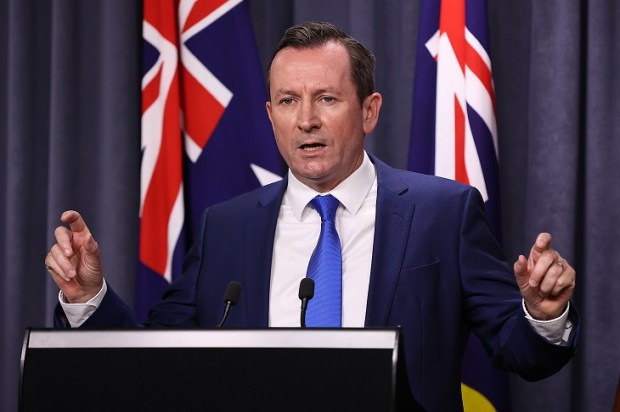It is to the 19th century British historian, politician, and moralist Lord Acton that we owe the phrase: ‘Power tends to corrupt, and absolute power corrupts absolutely.’ It conveys the sense that, as the power of rulers increases, their moral sense diminishes.
Since winning an extraordinary majority in both houses of Parliament at the 2021 state election, Western Australian Premier Mark McGowan has shown that he does not tolerate dissent. This was seen most recently when Mr McGowan used his super-majority to ram through legislation extending state of emergency powers until January 2023.
Prior to that, his government had a policy (abandoned after public outcry) of prohibiting organisations with views that were ‘not in accordance with WA government policy’ from hiring out state-run theatres for events. This (shockingly) meant that the Australian Christian Lobby and Uyghur groups were banned from using state theatres in WA.
Further, following the election of a Daylight Saving Party member to the Upper House after getting 98 first preference votes at the last state election, McGowan used that as an excuse to remove regional representation in WA’s electoral laws, thus effectively disenfranchising a constituency that not only provides the bulk of WA’s economic wealth, but traditionally would vote for the Liberal and National parties. This was despite public statements before the election that he would not do so.
However, there is one piece of legislation passed by the McGowan government that has received scant attention, but deserves far greater scrutiny. This legislation concerns the state’s Corruption and Crime Commission (CCC), and in particular the appointment of that body’s Commissioner.
Under the Corruption and Crime Commission Act 2003, the Commissioner has extraordinary semi-judicial and investigative powers. In granting these very wide powers to one person, the framers of the Act drafted it in such as way so that the Commissioner could not be directly appointed by the government of the day. Indeed, section 9 of the Act sets out a detailed vetting procedure for the appointment. The section states that a Commissioner must be recommended by a cross-party standing committee of both houses of Parliament from a list of three persons, who are recommended by a nominating committee including the Chief Justice of Western Australia, the Chief Judge of the District Court, and a person appointed by the Governor representing the interests of the community.
Before the last state election, the McGowan government wanted to reappoint John McKechnie QC as Commissioner but did not have the numbers in the Upper House to do so. However, after its landslide victory giving it a super-majority in both houses, the government passed an amendment to the Corruption and Crime Commission Act 2003 circumventing the vetting procedure and appointing Mr McKechnie for a further term of five years.
Mr McKechnie is a respected legal figure in WA and there is no intention here to cast aspersions on his professional conduct. However, when a State Premier has the ability to appoint a person to unilaterally control an anti-corruption body with such wide powers, such a state of affairs has serious potential to be misused, in that it sets up an apparently unhealthy relationship between the government of the day and the anti-corruption commissioner. I believe this sets a dangerous precedent for the politicisation of anti-corruption and other investigative bodies. Could this lead to a situation where the CCC is subverted to be used against political opponents?
In suggesting this, it must be borne in mind that the CCC in WA has engaged in similar actions to its NSW counterpart. That is, it has spent significant time, effort, and taxpayer dollars on matters where there was little to no chance of securing a conviction, resulting in untold personal and reputational harm to those the subject of its inquisitions, and their families. One such example is that of Nathan Hondros, a former chief-of-staff to a state government minister who was accused by the CCC of acting corruptly and disclosing official information to lobbyists Brian Burke and Julian Grill, who were similarly charged. After four years, the WA Supreme Court found all three had no case to answer.
Now the relationship between the CCC and its political masters is about to be tested, with claims emerging recently that political donors received preferential treatment to enter WA during state border closures in 2020.
During an unfair dismissal hearing by the Public Service Appeal Board of WA, former electorate officer for Deputy Premier Roger Cook, Sanja Spasojevic – who is accusing Mr Cook’s office of unfair dismissal – claimed she was instructed by the then Health Minister to fast-track G2G pass applications into WA for members of the Labor Business Roundtable.
Roundtable members pay thousands of dollars for access to senior members of the government including Premier Mark McGowan.
These accusations have come to light notwithstanding an extraordinary intervention by WA Attorney-General John Quigley late last year to stop the Public Service Appeal Board from calling his ministerial colleague Mr Cook to give evidence and be questioned under oath in this matter.
WA Opposition Leader Mia Davies has referred these allegations to the CCC for further investigation. The CCC has yet to advise if it will investigate further. If it decides against doing so, the suspicion could be raised that WA has become an elected dictatorship, with dire consequences for accountability, transparency, and the rule of law.
Dr Rocco Loiacono is a legal academic, writer and translator.
Got something to add? Join the discussion and comment below.
Get 10 issues for just $10
Subscribe to The Spectator Australia today for the next 10 magazine issues, plus full online access, for just $10.


























Comments
Don't miss out
Join the conversation with other Spectator Australia readers. Subscribe to leave a comment.
SUBSCRIBEAlready a subscriber? Log in